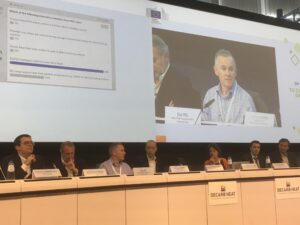On Thursday 7 June 2018, the event “Heating & Cooling in Europe – How can we decarbonise the sector by 2050 and fulfil the Paris Agreement?” took place in the framework of the European Sustainable Energy Week in Brussels.

Representatives from DG Energy, EU Commission (Mechthild Wörsdörfer, Director Renewables, Research & Innovation, Energy efficiency), the Austrian Permanent Representation (Michael Steurer, Energy attaché) and Radboud University Nijmegen (Florian Knobloch, Expert) as well as representatives of the Decarb Heat Initiative (AEBIOM, COGEN Europe, EHPA, Euroheat & Power, EPEE, EGEC, Solar Heat Europe/ESTIF) addressed the political framework of the decarbonisation of heating & cooling (H&C) and provided industry insights to advance towards a fully decarbonised sector by 2050.
The panelists conveyed key messages:
The decarbonisation of the H&C sector plays a crucial role in the overall decarbonisation of our society:
- We need to act now in order to prevent any further stagnancy towards full decarbonisation of H&C.
- The energy solutions to decarbonise the sector are already available today.
- An effective and efficient decarbonisation of H&C will require an integrated approach and the coupling of different solutions.
Mechthild Wörsdörfer stressed that H&C is not sufficiently addressed in the energy policy agenda but insisted that it will play a crucial role in the European Commission’s consultation exercise, taking place on 10-11 July 2018, in view of developing an energy roadmap for 2050. She also reminded participants that the most important part of European R&D Funds will be dedicated to climate, transport and energy, hence also to H&C.
Representatives of the H&C industry highlighted the main challenges and opportunities faced by the sector in terms of Europe’s future decarbonisation goals, while presenting the benefits of different technologies represented by the Decarb Heat Initiative. Namely, Alexandra Tudoroiu-Lakavice (COGEN Europe) mentioned that “Heat is embedded in local communities and is part of the wider energy system, with both domestic and industrial consumers relying on it and being supplied affordably, reliably and sustainably. Heat should not be addressed in an isolated way, but rather by unlocking synergies with existing energy infrastructures”. Thomas Nowak (EHPA) insisted that “we will not decarbonise the society if we do not decarbonise heating and cooling”. Adding to that, Andrea Voigt(EPEE) explained that “ambitious energy efficiency and renewable targets are key to trigger the needed investments in H&C”.
In parallel to the panel debate, participants were asked to interact with speakers by answering polls, therefore feeding the ongoing discussions. Interestingly, while half of the audience felt that heating accounts for 30 to 60% of their household bill, over a third of participants indicated not really knowing much about the energy consumption, the efficiency or the level of emissions of their heating systems.
Stefano Lambertucci (Solar Heat Europe/ESTIF) mentioned that the lack of awareness on available renewable and efficient H&C technologies is a key barrier for the decarbonisation of the sector. He explained that “if we want the energy transition to function, awareness from consumers, local authorities, policy makers and the financing community must be raised”.
The problem is to be found in the lack of debate on what policies could be implemented to decarbonise the sector” claimed Thomas Garabetian (EGEC), “we need to talk about what will enable the change, for instance the importance of planning at local level”. Eloi Piel (Euroheat & Power) recalled the importance of cities, as “the change will be implemented where most people live and consume energy”. Finally, Jean-François Sidler, representing AEBIOM, called for “a political framework that ensures enhanced awareness and that will enable people to consume energy in their homes – without polluting.”
The discussions concluded that the most important enablers to speed up decarbonisation are regulation, financing and behavourial change. All industry representatives also agreed on the need to turn H&C into one of the EU’s top policy priorities and to organise a dedicated high-level event this autumn, to ensure that discussions on these topics are continued.